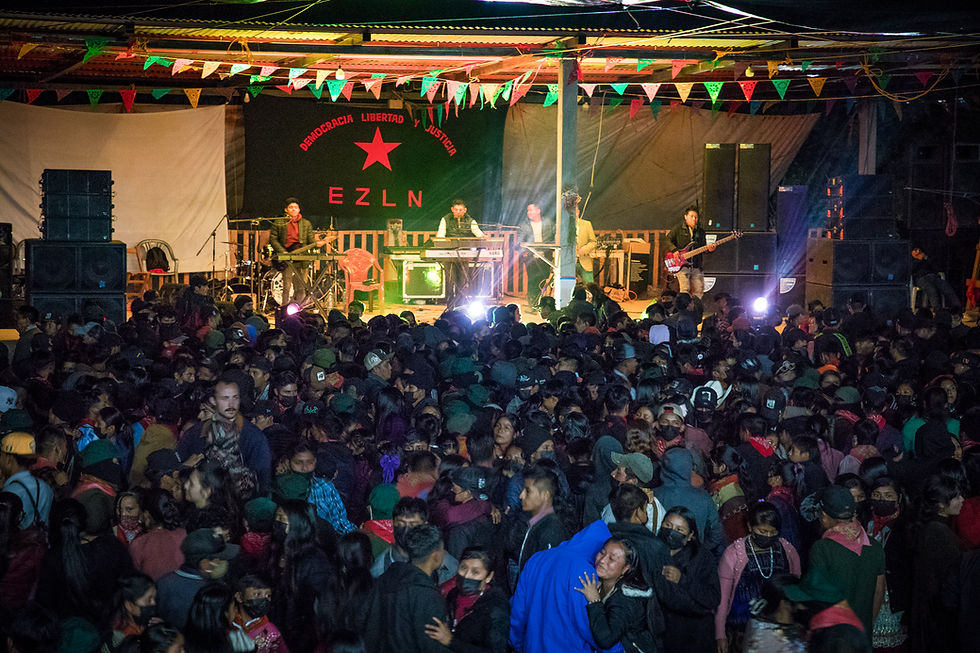From Popular Consultation to National Campaign for Truth and Justice
- contactocaminoalan

- Aug 15, 2021
- 4 min read
Por Magadalena Gómez
Publicado en Camino al Andar
15 de agosto de 2021.

Zapatista support bases vote “Yes” to supporting the rights of victims and their family members to truth and justice.
August 1st, 2021 will go on the books as the first popular consultation carried out on a national scale, based on the constitutional and legal product of the four decades of struggle to open the way to forms of direct democracy. However, due to very-low citizen participation, the exercise will also be judged as a defeat of the so-called Fourth Transformation (4T), because it stemmed from its initiative to consult on the probable trial of the five former presidents of the Republic in the period between 1988 and 2018.
As we know, in the process of formalization of said proposal, the Supreme Court of Justice reformulated the question to be consulted in the following terms: “Are you in agreement or not that the pertinent actions be carried out, in compliance with the constitutional legal framework, to undertake a process of clarification of political decisions made in past years by political actors, with the aim of guaranteeing justice and the rights of the possible victims?”
In light of this reading, considered ambiguous, the controversy was unleashed regarding the need to consult what is in the law. Nevertheless, as the entire political class was implicated in the electoral process, a sort of truce was declared until this past June 6th, knowing that the 1st of August was set as the date that the popular consultation would be realized with the organization of the INE (National Electoral Institute). Without it being prohibited to do so, the issue did not show up in the political campaigns of the parties, including Morena.
It is important to point that out because with a lapse of less than two months, the debate was reopened, unnecessarily to some extent, since the consultation would go forward regardless, but to some analysts it was important to delegitimize the process with an explicit dedication to its proponent, the President of the Republic.
Along with the debate in Morena promotion teams were formed for the consultation, orienting it to the initial topic, that is, a trial of the former president, even though the question no longer referred to them. Neither in the debate, nor in the activism of Morena were there any arguments with an eye to the victims of the decisions that supposedly would be clarified, or of achieving validity for this democratic exercise. Suddenly it seemed an exclusive issue in the arena of the political parties, obscuring the many, many collectives of family members of the disappeared.
On that point, last July 16th, the Zapatista Army of National Liberation laid out a position that no one expected. In a communiqué entitled “Why Yes to the consultation and Yes to the question,” it declared that the question to be consulted was not about judging or condemning anyone. It had to do with the rights of victims, of their right to justice and truth, and most importantly: that the communities belonging to the EZLN would participate in the public consultation of August 1st, 2021 “following practices of usos y costumbres1, and that those who have their voting credentials go to the polls, and for those that don’t the consultation will be extemporaneous.” (“Extemporaneous” was taken up following the racist posture of some of the officials of the Secretary of Foreign Relations in denying them their passports because they were not registered at birth at an opportune time, and then reflecting on it they realized that that is how they are considered.)
This news hearkened to the decision of supporting the National Indigenous Congress in the quest to have María de Jesus Patricio Martínez as an independent candidate appear on the ballot for the Presidency of the Republic in 2018. It is also a surprise now that they decided to participate in the aforementioned consultation, with their own ways and means. Proof of that is that on July 31, one day before the official consultation, they shared the developments in the sense that in 12 caracoles and their respective Juntas de Buen Gobierno2(JBG) had received the minutes from 756 indigenous communities, roadside stops and ranch sites, from speakers of Mayan languages: Zoque, Tojolobal, Mame, Tseltal, Tsotsil and Cho’l about the popular consultation, who voted “Yes” in favor of the question of “whether they are or are not in favor of doing what is necessary to support the rights of the victims and their family members, to truth and justice.” This report and the ones that followed, will be delivered to the collectives of the movement for victims in the country.
This and subsequent reports will be delivered to the victims’ movement collectives in the country. In passing, they reported that the political party supporters reported that the only thing that the government officials have done is to threaten the people that if they do not “vote” in the consultation, they will be “cut off” from the support of governmental programs. This is what they were told: if you do not want to lose your paid support, go and say “Yes.” The old practices. While their opponents point to the 4T and the President of the Republic as having been defeated, the EZLN has already launched the National Campaign for Truth and Justice.
Translation by Kate Keller




Comments